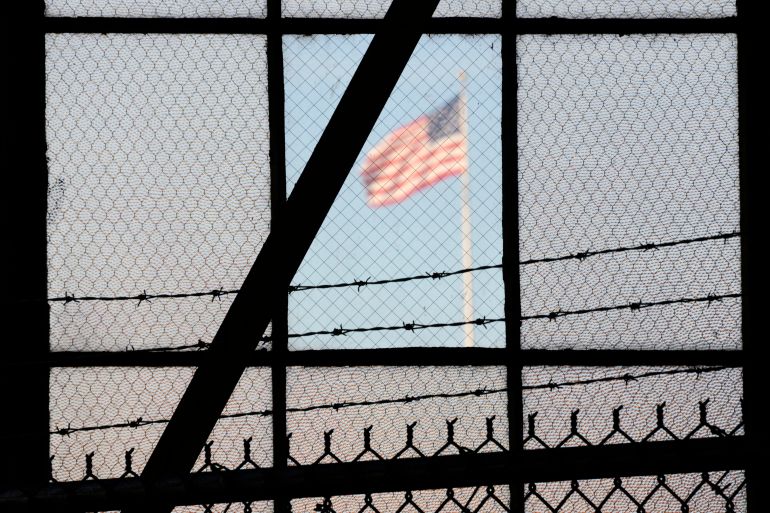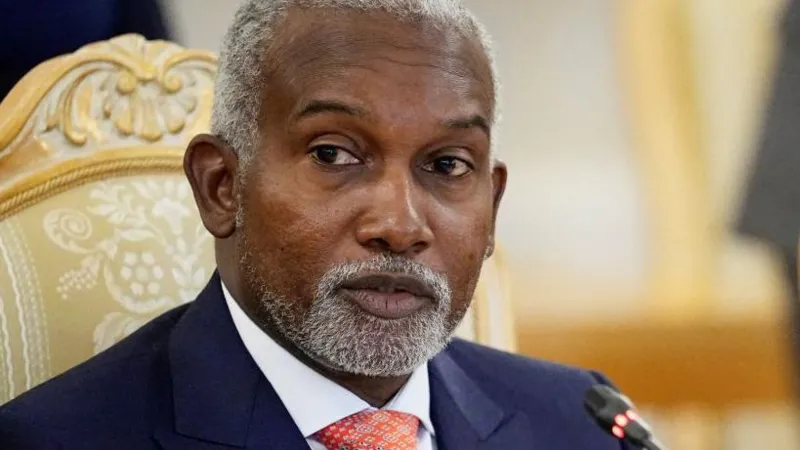‘Secrecy the priority’: Guantanamo battling COVID outbreak
Lawyers say the ‘massive’ outbreak puts already unwell detainees at further risk in camp where medical care is poor.

A reported outbreak of COVID-19 at the United States’s Guantanamo Bay Detention Camp in Cuba is causing concern for the legal counsel and family members of detainees amid a lack of transparency about the status of those affected.
“As I understand it, many detainees in both camps have contracted COVID within the last couple of weeks, although the US government will not confirm numbers,” Alka Pradhan, an international human rights lawyer who represents one of the detainees at Guantanamo, told Al Jazeera.
She added it was not clear how the virus was introduced to the camps and that some of the camp’s guards were also ill.
“It’s a massive outbreak,” another source familiar with the situation and speaking on condition of anonymity told Al Jazeera. “This is the most severe outbreak in the detainee population in the camp itself ever and it is the first time that something like this has happened on this scale.”
“As Guantanamo is so politically sensitive, the US government should be making handling it a priority.”
The highly secretive US-run prison in Cuba, which opened as part of the so-called “war on terror” in the wake of the September 11, 2011 attacks, currently has some 34 detainees split across two camps.
The outbreak is thought to have been gathering momentum since last month.
“It took days for the government to notify any of the lawyers that their clients had tested positive and when we asked about what treatment options were available, we were told to file a discovery request,” Pradhan said.
A discovery request is the formal process of exchanging information between legal parties about the witnesses and evidence to be presented at trial.
“Secrecy is the priority, not care.”
While Guantanamo Bay once held some 780 prisoners, it now operates only Camp 5 and Camp 6 – the first for so-called “high value” detainees and the second for those designated “low value”.
“High-value” inmates are those who were transferred to Guantanamo in 2006 and 2007 after being held at overseas CIA facilities known as “black sites”, where they were subjected to torture including beatings, waterboarding and sexual assault.
Many of the men are suffering from health conditions as a result of their treatment and prolonged detention.
Pradhan told Al Jazeera that her client, Ammar al Baluchi, tested positive for COVID-19 two weeks ago at Camp 5 and that his condition was worrying because of his existing health issues.
Baluchi, a 45-year-old Pakistani national, is accused of helping to facilitate the 9/11 attacks and acting as a financial courier for al-Qaeda founder Osama bin Laden, although he is still awaiting trial at a military court at Guantanamo.
“Ammar already suffers from brain damage, multiple traumatic brain injuries (TBIs) and sleep disturbances (inability to sleep for more than a couple of hours at a time) from his torture in CIA custody from 2003 to 2006,” Pradhan said.
“He is also in cognitive decline as a result of his untreated TBIs. The added COVID symptoms of brain fog and extreme fatigue have been extremely worrisome, and we have asked about his treatment in the hopes that he will not suffer from long COVID.”
The outside of the Guantanamo Bay naval facility, with barbed wire running along the top of the fence and a sign that says: 'CAMP V, JTF Guantanamo, Honor Bound to Defend Freedom'
Pradhan added that Baluchi is vaccinated against COVID-19 but it is thought that some other detainees at the facility have refused the vaccine because they do not trust the authorities.
“These are old men and some of them have comorbidities,” a source familiar with the layout of the camps told Al Jazeera, adding that COVID-19 could easily spread at the site due to the relatively relaxed atmosphere in recent years, particularly at Camp 6 that houses the detainees who did not arrive at Guantanamo via the CIA sites.
“The camp is made up of four atriums and a collective living space and houses around 20 prisoners. It’s like a medium-security prison,” the source said.
Even the Camp 5 detainees have some freedom of movement during the day. They can move between blocks and spend time in communal prayer and food areas where they can mingle.
One of them is Indonesian national Encep Nurjaman, who is more widely known as Hambali.
The 58-year-old is accused of having masterminded the Bali Bombings in 2002, which left more than 200 people dead and a further 200 injured when multiple bombs ripped through a popular nightlife area on the island of Bali in Indonesia. Hambali was arrested in Thailand in 2003 and charged last year. His trial has yet to start.
It is believed that Hambali is one of the detainees who has contracted COVID-19 as a result of the recent outbreak.
When contacted by Al Jazeera, Hambali’s brother Gun Gun declined to comment on the current status of his brother’s health.
-al jazeera







